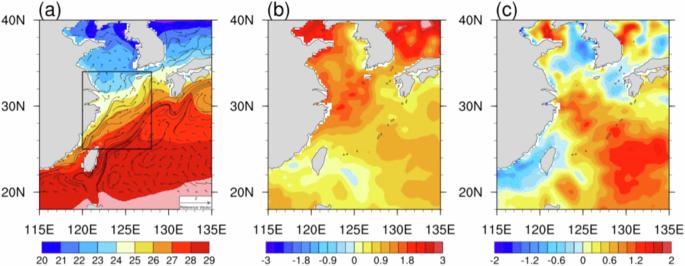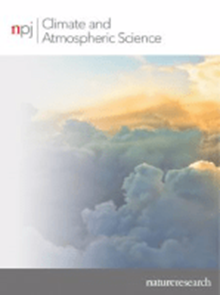Late-arriving 2023 summer marine heatwave in the East China Sea and implications for global warming
IF 8.5
1区 地球科学
Q1 METEOROLOGY & ATMOSPHERIC SCIENCES
引用次数: 0
Abstract
In 2023, the global temperature rose significantly, triggering a marine heatwave (MHW) in the East China Sea (ECS) from August 12 to October 13. Unlike the typical July onset, this event was delayed. Here we investigate the mechanisms behind the late onset and prolonged duration of the 2023 MHW in the ECS and its potential linkage to global warming. The early phase was driven by shortwave radiation and ocean dynamics, while the later phase saw reduced northerly winds, allowing warmer, more humid southerlies to dominate. This shift decreased the air-sea humidity difference, enhancing downward latent heat fluxes. Future CMIP6 projections also suggest that delayed MHWs are linked to weak heat exchanges, limiting the oceanic heat transport to the atmosphere. Our findings highlight the increasing risk of prolonged MHWs in the ECS and the urgent need for improved climate preparedness.

2023年中国东海夏季海洋热浪迟来及其对全球变暖的影响
2023年,全球气温明显上升,在8月12日至10月13日期间在东海引发了一次海洋热浪(MHW)。与典型的7月爆发不同,这次疫情推迟了。在此,我们研究了2023年欧洲热带气旋晚发和持续时间长背后的机制,以及它与全球变暖的潜在联系。早期阶段是由短波辐射和海洋动力学驱动的,而后期阶段北风减少,让更温暖、更潮湿的南风占据主导地位。这种转变减小了海气湿度差,增强了向下的潜热通量。未来的CMIP6预测还表明,延迟的高磁暴与微弱的热交换有关,限制了海洋向大气的热量输送。我们的研究结果强调了ECS长时间MHWs的风险增加以及改善气候准备的迫切需要。
本文章由计算机程序翻译,如有差异,请以英文原文为准。
求助全文
约1分钟内获得全文
求助全文
来源期刊

npj Climate and Atmospheric Science
Earth and Planetary Sciences-Atmospheric Science
CiteScore
8.80
自引率
3.30%
发文量
87
审稿时长
21 weeks
期刊介绍:
npj Climate and Atmospheric Science is an open-access journal encompassing the relevant physical, chemical, and biological aspects of atmospheric and climate science. The journal places particular emphasis on regional studies that unveil new insights into specific localities, including examinations of local atmospheric composition, such as aerosols.
The range of topics covered by the journal includes climate dynamics, climate variability, weather and climate prediction, climate change, ocean dynamics, weather extremes, air pollution, atmospheric chemistry (including aerosols), the hydrological cycle, and atmosphere–ocean and atmosphere–land interactions. The journal welcomes studies employing a diverse array of methods, including numerical and statistical modeling, the development and application of in situ observational techniques, remote sensing, and the development or evaluation of new reanalyses.
 求助内容:
求助内容: 应助结果提醒方式:
应助结果提醒方式:


